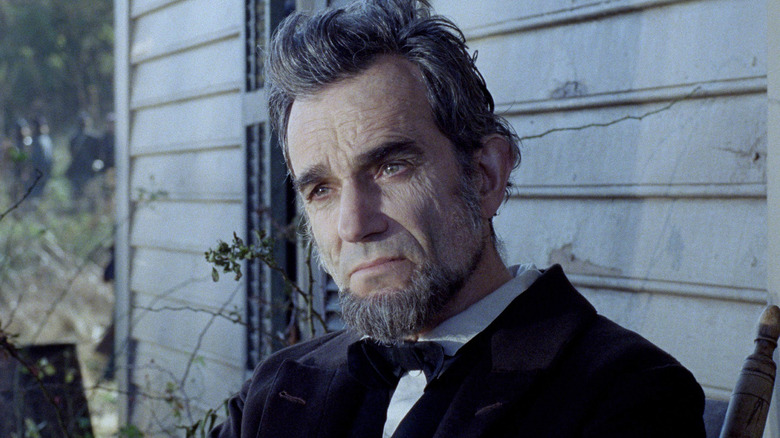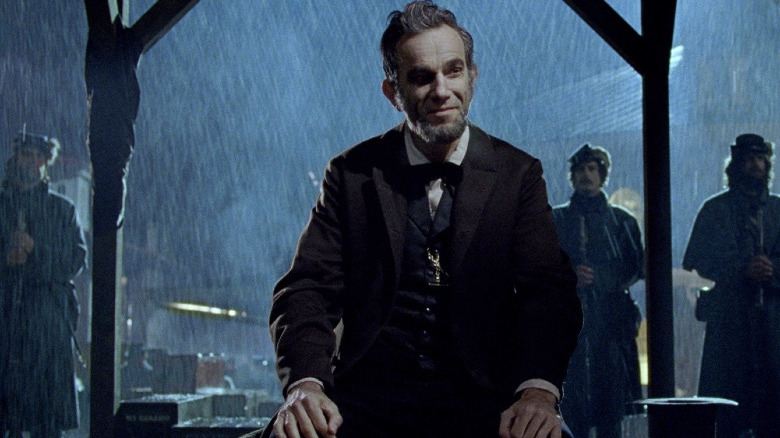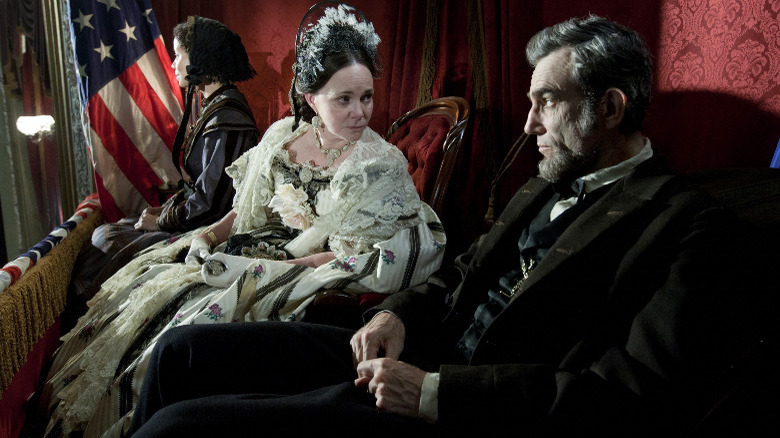Steven Spielberg Never Saw Lincoln As A Biopic
"Abraham Lincoln has to think about his whole life before he abolishes slavery and ends the Civil War."
This sentence, I can assure you, is not a real line of dialogue from Steven Spielberg's 2012 film "Lincoln." Nor, for that matter, is "Lincoln" what you would call a typical biopic. The movie takes place over the last four months of Lincoln's life in 1865, yet the titular U.S. president is almost a secondary concern in its story. Rather, the true core of the film is Lincoln and his Republican party's efforts to abolish slavery by passing the 13th Amendment to the U.S. Constitution without sabotaging Lincoln's peace negotiations with the Confederacy (and vice versa).
"Lincoln" was released in theaters on November 9, 2012, shortly after that year's U.S. presidential election. That was a deliberate choice by Spielberg, who insisted he didn't want the film to become "political fodder." In a 2012 interview with Movieline, the director said he would've been "very glad" to have made the movie as far back as 2000, lest audiences read too much into Republicans being portrayed as more progressive and liberal than Democrats in Lincoln's time:
"There's a lot of confusion about the political ideologies of both parties, [which] have switched 180 degrees in 150 years. It's just too confusing."
Why 2000 specifically? It's because the seeds for "Lincoln" were planted in 1999, when Spielberg met Pulitzer Prize-winning writer and historian Doris Kearns Goodwin. After the latter informed him she was working on a book about Lincoln (which would be published in 2005 as "Team of Rivals: The Political Genius of Abraham Lincoln"), Spielberg was quick to buy the film rights. Even back then, however, he had no intent of making a traditional cradle-to-the-grave biopic, or even one that would cover all of Lincoln's presidency.
One of many possible portraits
Movies about musicians, in particular, are infamous for reducing their topic's remarkable lives to a glorified series of bullet-points (a formula gleefully mocked by the inspiration for the joke at the start of this article, "Walk Hard: The Dewey Cox Story"). In truth, though, other types of biopics are often just as guilty of being glib, sacrificing depth in order to touch upon as many noteworthy historical incidents as possible. Suffice it to say, Steven Spielberg was never interested in making a film like that. Instead, as he told Deadline in 2012, his goal was always for "Lincoln" to feel like one of many portraits one could paint of Abraham Lincoln:
"I never saw it as a biopic. I sometimes refer to it as a Lincoln portrait, meaning that it was one painting out of many that could have been drawn over the years of the president's life. Had I done the entire presidency, or his entire life, that would have qualified as biopic."
In his search for the right approach, Spielberg cycled through many iterations of the film. One such early version was a war drama centered on the last three years of the U.S. Civil War, depicting no less than seven battles. Likening it to "Saving Private Ryan," Spielberg admitted to Deadline the script "quickly wore thin on me and [it] became clear that it was not the story I wanted to tell."
Among the other "Lincoln" scripts developed was one Spielberg described to IGN in 2003 as being centered on old Abe's relationship with abolitionist Frederick Douglass. One wonders how that iteration might have gone over, given the final version of "Lincoln" was (not unfairly) criticized for glossing over the role Douglass and other abolitionists played in the struggle to end slavery.
A more focused approach
Eventually, "Lincoln" writer Tony Kushner would adapt "Team of Rivals" into a 550-page script. Obviously, unless they were going to make the project for TV instead of theaters (which they almost did), Kushner and Steven Spielberg knew they would have to whittle all this material down into something manageable. Question was, which elements did they find the most captivating? "For me, the most compelling part of that screenplay was a 65-page section which was the struggle to pass the 13th Amendment that abolished slavery," Spielberg told Deadline.
The director continued, explaining how he and Kushner came to realize the more they tried to cover in Lincoln's life, the less impactful the story:
"Tony and I found that the more real estate of Lincoln's life we covered, the more it diminished him as someone who understood politics, personalities, and political theater. And it took us away from his family. It took us away from the deep cold depths he would find himself in that some people thought was his form of depression. It took us away from all that because it covered too much territory."
No arguments here. Anchored by Daniel Day-Lewis' transformative performance as the 16th U.S. president, "Lincoln" benefits immensely from taking a far more concentrated look at a key moment in history. By narrowing its focus to the passage of a single piece of legislation, the film proves to be much more insightful and otherwise fascinating than the type of glossy but hollow movie memoirs Hollywood tends to churn out. That it also manages to spotlight the ways the political climate of 2012 paralleled that of 1865 (albeit with Republicans and Democrats having fully swapped places since Lincoln's time) just goes to show: Spielberg was right to make a "portrait" instead of a "biopic."


